 An important part of working with ancient DNA is an uncontaminated sample, hence special attire and strict work discipline are mandatory. From left: Justina Kozakaitė, Rita Radzevičiūtė, Ingrida Domarkienė / Photo from personal archive
An important part of working with ancient DNA is an uncontaminated sample, hence special attire and strict work discipline are mandatory. From left: Justina Kozakaitė, Rita Radzevičiūtė, Ingrida Domarkienė / Photo from personal archive
During this year's April 21-27, researchers from the Faculty of Medicine at Vilnius University, associate professor Ingrida Domarkienė and Justina Kozakaitė (PhD), visited the Max Planck Institute for Evolutionary Anthropology in Jena and Leipzig, Germany. The purpose of the scientific visit was to familiarize themselves with new methods of working with ancient DNA and to acquire valuable laboratory experience.
At the Max Planck Institute for Evolutionary Anthropology laboratory in Jena, the representatives from the Faculty of Medicine were received and shared experiences with laboratory leader Rita Radzevičiūtė. In Leipzig, the researchers met with the team led by Prof. Johannes Krause at the Department of Archaeogenetics: they familiarized themselves with the organization of the researchers' work, the available infrastructure, and its functioning. They presented an impressive collection of archaeological remains accumulated at Vilnius University, existing and emerging possibilities for conducting scientific research related to ancient DNA, shared experiences from completed and ongoing national and international projects in this field, visions for the future, and emerging challenges. During the visit, possible directions for joint research and collaboration opportunities in submitting international project applications were discussed. They also discussed the specifics of ancient DNA research laboratories, the advantages and challenges of interdisciplinary research team work, collaboration experiences in Lithuania and worldwide, and the prospects for research in small laboratories.
"This visit is a very important step in implementing the vision of the Research Center of the Faculty of Medicine of Vilnius University. It is important not only for developing local research capabilities in the field of ancient DNA research but also for Lithuania to significantly contribute to global projects reconstructing human evolution, migration, or disease histories and understanding them, and to carry out independent research on historical issues relevant to our region," said Assoc. Prof. Ingrida Domarkienė about the scientific visit.
 Initial attempts with a new method to prepare bone material for ancient DNA extraction (Justina Kozakaitė). Photo on the right: Near the historic Pharmapark building in Jena, Germany, where laboratories of two Max Planck institutes are located - Evolutionary Anthropology and Geoanthropology. From left: Justina Kozakaitė, Ingrida Domarkienė / Photos from personal archive
Initial attempts with a new method to prepare bone material for ancient DNA extraction (Justina Kozakaitė). Photo on the right: Near the historic Pharmapark building in Jena, Germany, where laboratories of two Max Planck institutes are located - Evolutionary Anthropology and Geoanthropology. From left: Justina Kozakaitė, Ingrida Domarkienė / Photos from personal archive
